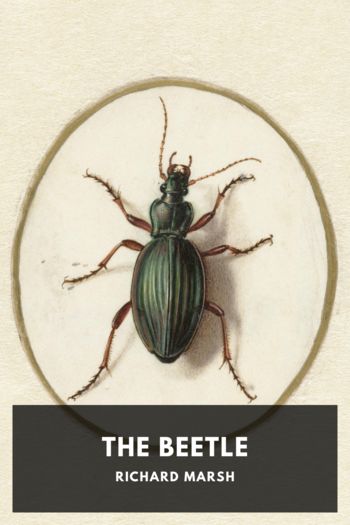The Beetle - Richard Marsh (top romance novels txt) 📗

- Author: Richard Marsh
Book online «The Beetle - Richard Marsh (top romance novels txt) 📗». Author Richard Marsh
But I never supposed he loved me—never. I am not even sure that, for some time, I was aware that I loved him. We were great on friendship, both of us.—I was quite aware that I was his friend—that he regarded me as his friend; he told me so more than once.
“I tell you this,” he would say, referring to this, that, or the other, “because I know that, in speaking to you, I am speaking to a friend.”
With him those were not empty words. All kinds of people talk to one like that—especially men; it is a kind of formula which they use with every woman who shows herself disposed to listen. But Paul is not like that. He is chary of speech; not by any means a woman’s man. I tell him that is his weakest point. If legend does not lie more even than is common, few politicians have achieved prosperity without the aid of women. He replies that he is not a politician; that he never means to be a politician. He simply wishes to work for his country; if his country does not need his services—well, let it be. Papa’s political friends have always so many axes of their own to grind, that, at first, to hear a member of Parliament talk like that was almost disquieting. I had dreamed of men like that; but I never encountered one till I met Paul Lessingham.
Our friendship was a pleasant one. It became pleasanter and pleasanter. Until there came a time when he told me everything; the dreams he dreamed; the plans which he had planned; the great purposes which, if health and strength were given him, he intended to carry to a great fulfilment. And, at last, he told me something else.
It was after a meeting at a Working Women’s Club in Westminster. He had spoken, and I had spoken too. I don’t know what papa would have said, if he had known, but I had. A formal resolution had been proposed, and I had seconded it—in perhaps a couple of hundred words; but that would have been quite enough for papa to have regarded me as an Abandoned Wretch—papa always puts those sort of words into capitals. Papa regards a speechifying woman as a thing of horror—I have known him look askance at a Primrose Dame.
The night was fine. Paul proposed that I should walk with him down the Westminster Bridge Road, until we reached the House, and then he would see me into a cab. I did as he suggested. It was still early, not yet ten, and the streets were alive with people. Our conversation, as we went, was entirely political. The Agricultural Amendment Act was then before the Commons, and Paul felt very strongly that it was one of those measures which give with one hand, while taking with the other. The committee stage was at hand, and already several amendments were threatened, the effect of which would be to strengthen the landlord at the expense of the tenant. More than one of these, and they not the most moderate, were to be proposed by papa. Paul was pointing out how it would be his duty to oppose these tooth and nail, when, all at once, he stopped.
“I sometimes wonder how you really feel upon this matter.”
“What matter?”
“On the difference of opinion, in political matters, which exists between your father and myself. I am conscious that Mr. Lindon regards my action as a personal question, and resents it so keenly, that I am sometimes moved to wonder if at least a portion of his resentment is not shared by you.”
“I have explained; I consider papa the politician as one person, and papa the father as quite another.”
“You are his daughter.”
“Certainly I am;—but would you, on that account, wish me to share his political opinions, even though I believe them to be wrong?”
“You love him.”
“Of course I do—he is the best of fathers.”
“Your defection will be a grievous disappointment.”
I looked at him out of the corner of my eye. I wondered what was passing through his mind. The subject of my relations with papa was one which, without saying anything at all about it, we had consented to taboo.
“I am not so sure. I am permeated with a suspicion that papa has no politics.”
“Miss Lindon!—I fancy that I can adduce proof to the contrary.”
“I believe that if papa were to marry again, say, a Home Ruler, within three weeks his wife’s politics would be his own.”
Paul thought before he spoke; then he smiled.
“I suppose that men sometimes do change their coats to please their wives—even their political ones.”
“Papa’s opinions are the opinions of those with whom he mixes. The reason why he consorts with Tories of the crusted school is because he fears that if he associated with anybody else—with Radicals, say—before he knew it, he would be a Radical too. With him, association is synonymus with logic.”
Paul laughed outright. By this time we had reached Westminster Bridge. Standing, we looked down upon the river. A long line of lanterns was gliding mysteriously over the waters; it was a tug towing a string of barges. For some moments neither spoke. Then Paul recurred to what I had just been saying.
“And you—do you think marriage would colour your convictions?”
“Would it yours?”
“That depends.” He was silent. Then he said, in that tone which I had learned to look





Comments (0)